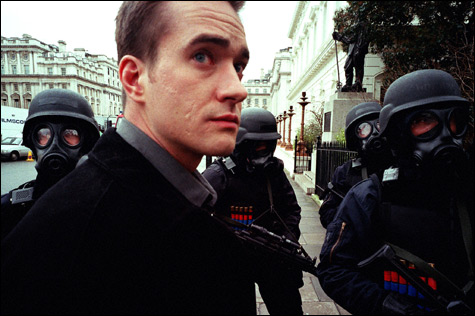
SEDITIOUS: Better literature makes better — not to mention more realistic — television. |
| MI-5 | WGBH 44 | Tuesdays at 10 pm [Starts April 7] |
When in 2002 BBC1 launched Spooks, from independent producer Kudos Film and Television, it must have been something of a courageous act. Spooks, retitled MI-5 in America, and starting this Tuesday on WGBH 44, follows the exploits of Britain’s play-dirty domestic counter-espionage/terrorism force (FBI comparable), which is beset on all sides in the wake of 9/11. All the more remarkable, then, that in each of the first two episodes, the ultimate obstacle to justice is not the evildoers but the home office — the government, which values foreign-policy politics and relations with the CIA above enforcement. US suspense shows may adopt that angle today; they didn’t so much in ’02, when we needed it. For those terrorist-paranoid times, MI-5 probably seemed downright seditious.In general, Brit crime dramas trump their US counterparts in everything from dialogue to casting to cinematography. When American screenwriters want to “humanize” (or, as per contract clause, “showcase”) a regular character, they generally throw him or her into some ridiculous one-off spotlighted crisis. (Think George Eades buried alive in Quentin Tarantino’s 2005 CSI two-parter.) In British scripts, the characters arrive rounded, stressed, and flawed, their job performances and team interactions inseparable from their personalities. (Think Trevor Eve’s Peter Boyd or any character in the BBC’s Waking the Dead.) Better literature makes better — not to mention more realistic — television.

Like the one American exception, The Wire, MI-5 works hard for believability; and like The Wire, it has so many characters with similar haircuts, skin color, and accents that at first it’s confusing. But by episode two, viewers have figured out that the “main” character is Tom Quinn, whose girlfriend calls him Matthew, thinks he’s an IT geek, and doesn’t know he’s a spy. Tom is played by Matthew Macfadyen — Darcy in the Keira Knightley Pride & Prejudice and Arthur Clennam in WGBH’s current Little Dorrit. The rest of the cast, whose number includes a multitude of non-regulars, are universally solid performers, among them Peter Firth (as the boss) and Jenny Agutter (as something I won’t disclose).
The show’s only flaw comes from trying too hard. As opposed to, say, Prime Suspect, the characters don’t consistently reinforce their individuality, and on-the-job conversations can tend toward the terse, stylized, and comic-bookish. MI-5’s style, in fact, is at times overpowering as it saws at an experimental edge that’s become familiar (and a little dated) in the seven years since the show was filmed. The narrative is dealt out in fast cuts that are more snippets than scenes. Film editors rely on old-school multiple-split-screen action to portray anxious moments, a gimmick that big-screen Hollywood abandoned in the late ’70s and that easily borders on parody. (One split-screen race-against-time sequence incorporates shots of the team frantically installing surveillance bugs in smoke alarms while blow-drying a cat. Long story.)
And, like too many television anti-crime units, MI-5 is endowed with magic computers capable of isolating all sorts of secure/obscure data from the cybersphere in impossibly convenient and useful contexts. At least the team have an Asperger’s prodigy (grumpily played by Hugh Simon) who seems to live at headquarters and who knows how to use said computers.
But these detractions pale before MI-5’s larger merits, and simply saying it’s superior to similar American efforts undersells it. US viewers will have to get past the deliberately anxious pace, as well as both the clipped British accents and the horribly mimicked American ones, but once you buy into it — period-piece production tricks and all — MI-5 is one thing television almost never is: genuinely suspenseful, engaging, and exciting. Call it manipulation if you like, but with the right material, it works.